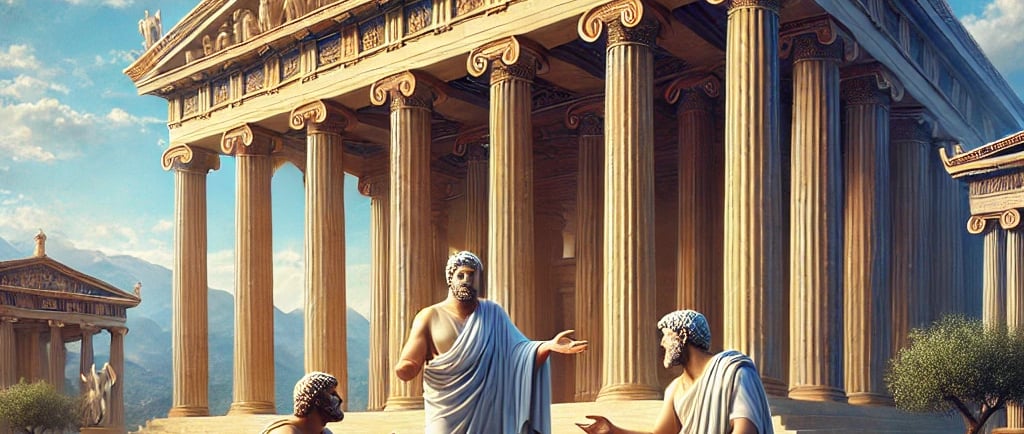Zeno of Citium and His Stoic Enduring Legacy
Why Zeno of Citium Still Matters Today In a world filled with uncertainty, stress, and distractions, many people are rediscovering Stoicism, an ancient philosophy that provides a roadmap for resilience, wisdom, and inner peace. At the heart of this transformative philosophy is Zeno of Citium, the man who founded Stoicism over 2,000 years ago.
LP
3/10/20254 min read


Zeno of Citium: The Founder of Stoicism and His Enduring Legacy
Introduction: Why Zeno of Citium Still Matters Today
In a world filled with uncertainty, stress, and distractions, many people are rediscovering Stoicism, an ancient philosophy that provides a roadmap for resilience, wisdom, and inner peace. At the heart of this transformative philosophy is Zeno of Citium, the man who founded Stoicism over 2,000 years ago.
But who was Zeno of Citium? What inspired him to create Stoicism? And how can his teachings help us navigate modern challenges? In this article, we’ll explore:
✅ Zeno’s life and historical context
✅ Why Stoicism is called "Stoicism"
✅ The political and philosophical environment of his time
✅ Interesting facts and curiosities about Zeno
✅ How his legacy still influences modern thinkers
If you’re passionate about self-improvement, philosophy, and transformative translations of ancient wisdom, keep reading!
1. The Life of Zeno of Citium: From Merchant to Philosopher
Who Was Zeno of Citium?
Zeno of Citium was born around 334 BCE in Citium (modern-day Larnaca, Cyprus), a Greek-speaking city under the influence of the Phoenicians. Unlike many philosophers who came from aristocratic backgrounds, Zeno was the son of a merchant, and his early life was shaped by the world of commerce and trade.
The Turning Point: A Shipwreck That Changed Everything
According to legend, Zeno’s journey into philosophy began with a shipwreck. As he was traveling on a trading mission, his ship sank, leaving him stranded in Athens. With no possessions and no clear future, he wandered into a bookshop and started reading about the life of Socrates. Fascinated by philosophy, he asked the bookseller where he could find a philosopher to learn from. The bookseller pointed to Crates of Thebes, a well-known Cynic philosopher.
Training Under the Cynics
Zeno became a disciple of Crates, who belonged to the Cynic school of philosophy. The Cynics believed in:
✔ Rejecting wealth and material possessions
✔ Living according to nature
✔ Developing mental resilience against hardships
However, while Zeno admired Cynicism’s emphasis on self-discipline, he found it too extreme. The Cynics were known for public acts of defiance, such as living on the streets, rejecting social norms, and embracing extreme asceticism. Zeno wanted to create a philosophy that balanced reason, virtue, and emotional resilience—and so, Stoicism was born.
2. Why Is It Called "Stoicism"?
Unlike other philosophers who taught in schools or academies, Zeno taught in public at a famous location in Athens called the Stoa Poikile (the "Painted Porch"). This was a colonnaded walkway where citizens gathered to discuss ideas, politics, and daily life.
Because of this, his followers became known as "Stoics", named after the Stoa where he lectured.
Stoicism wasn’t just a theory—it was a way of life, teaching people how to:
✔ Face hardship with courage
✔ Control their emotions
✔ Live with wisdom and virtue
Zeno’s practical philosophy made Stoicism one of the most influential schools of thought in history, shaping leaders, warriors, and thinkers from ancient Rome to the modern world.
3. The Historical and Political Context of Zeno’s Stoicism
A Time of Change: From City-States to Empires
Zeno lived during a time of great transformation. The classical Greek world, dominated by independent city-states (poleis), was collapsing. In its place, massive empires were forming, including:
✔ The Macedonian Empire under Alexander the Great
✔ The Hellenistic kingdoms that followed Alexander’s death
This shift from local governance to imperial rule created uncertainty. Traditional civic virtues, like political participation, became less relevant. People needed a new philosophy—one that focused on individual ethics rather than political engagement.
A Reaction to Cynicism and Hedonism
During this time, other philosophical schools were competing for influence:
✔ Cynics rejected all social norms and lived in extreme poverty.
✔ Epicureans sought pleasure and avoidance of pain.
✔ Aristotelians focused on logic and the pursuit of knowledge.
Zeno synthesized elements from these schools, emphasizing rationality, virtue, and self-discipline, making Stoicism both practical and adaptable to different social conditions.
4. Interesting Facts About Zeno of Citium
🤯 He wasn’t Greek-born, but his philosophy became one of the most Greek-centric ideas.
🤯 His students were so loyal that they refused to modify his teachings after his death.
🤯 Despite being a philosopher, he was also physically active, emphasizing balance in body and mind.
🤯 Unlike many teachers of his time, he accepted students from all social backgrounds.
🤯 His works are mostly lost, but his ideas survived through later Stoics like Seneca, Epictetus, and Marcus Aurelius.
5. The Lasting Impact of Zeno’s Philosophy
After Zeno’s death around 262 BCE, his followers continued to develop Stoicism, leading to its golden age in Rome. Stoic philosophy influenced some of the greatest thinkers, including:
✔ Seneca (Roman statesman and writer)
✔ Epictetus (a former slave turned philosopher)
✔ Marcus Aurelius (the philosopher-emperor of Rome)
Even today, leaders, entrepreneurs, and thinkers apply Stoic principles to manage stress, develop resilience, and make better decisions.
How Stoicism Can Help You Today
📌 Mindset Control – Focus on what you can control, let go of what you cannot.
📌 Emotional Resilience – Stay calm under pressure and overcome obstacles with logic.
📌 Virtuous Living – Live with integrity, wisdom, and discipline.
📌 Freedom from Anxiety – Accept life’s uncertainties with grace and courage.
6. Conclusion: Why You Should Read More About Stoicism
Zeno of Citium’s Stoic philosophy remains relevant today, helping people cultivate:
✅ Inner peace in a chaotic world
✅ Self-discipline and control over emotions
✅ A rational approach to problems and setbacks
If you want to dive deeper into Stoicism, explore our ebooks on philosophy and transformative translations of ancient texts, available at Culture for Everyone.
🛒 Check out our exclusive Stoic book collection here: [Insert Your Ebook Link]
Start your Stoic journey today—Zeno’s wisdom is waiting for you! 🚀
Get Previews & News
© 2025. All rights reserved.


